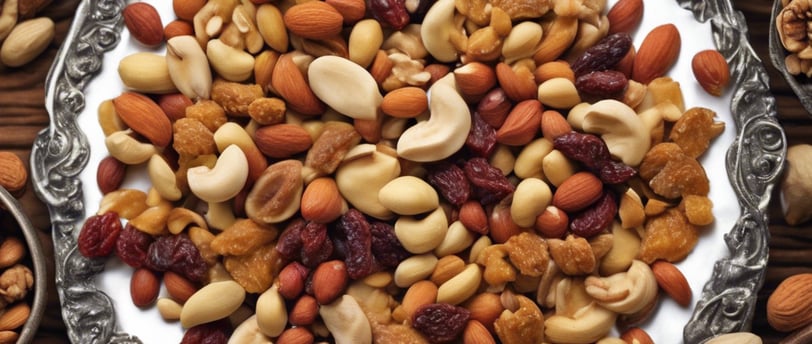Snacking Smart: How Dry Fruits Can Help You Maintain a Healthy Weight
Discover how nutrient-rich dry fruits can be a delicious and healthy snack option. Learn about the benefits of incorporating dry fruits into your diet, from boosting energy levels to aiding weight management.
11/7/20244 min read


Understanding Dry Fruits and Their Nutritional Benefits
Dry fruits, often referred to as dried fruits or dehydrated fruits, are fruits that have had most of their moisture removed through various drying methods. This process concentrates their flavor and sweetness, making them a popular snack choice. Common examples of dry fruits include raisins, apricots, dates, figs, and the trio of nuts: almonds, walnuts, and cashews. These nutritionally dense foods serve not only as satisfying snacks but also provide a plethora of health benefits.
Almonds are particularly rich in healthy fats, specifically monounsaturated fats, which are known to support heart health. Additionally, they contain a good amount of protein, making them a filling option for quick snacking. One ounce of almonds provides approximately 6 grams of protein and a significant amount of vitamin E, an antioxidant that helps protect the body from oxidative stress.
Walnuts, on the other hand, are recognized for their omega-3 fatty acids, which contribute to brain health and have anti-inflammatory properties. They also offer an impressive amount of antioxidants and a variety of vitamins and minerals, including magnesium and phosphorus, which are vital for optimal bodily functions.
Cashews are another nutritional powerhouse that provides healthy fats, protein, and essential minerals such as zinc and iron. These nutrients support various bodily functions, including immune health and energy production. The fiber content in dry fruits, including almonds, walnuts, and cashews, enhances digestive health and contributes to a sense of fullness, thereby assisting in weight management.
Incorporating dry fruits into your diet not only serves as a delicious alternative to processed snacks but also supports overall health. Their collective nutritional benefits make them a suitable choice for those looking to maintain a healthy weight while enjoying diverse flavors and textures.
Incorporating Dry Fruits into Your Diet
Dry fruits are a nutritious addition to a balanced diet, providing essential vitamins, minerals, and fiber. Incorporating them into your daily meals and snacks can enhance both taste and nutritional value. One of the simplest ways to enjoy dry fruits is by adding them to smoothies. Blending a handful of dried apricots or dates with yogurt, milk, or your favorite fruits can create a delicious and filling smoothie that promotes satiety. This vibrant beverage not only serves as a refreshing breakfast option but also as a mid-afternoon snack that fuels your energy levels.
Another effective strategy is to sprinkle dry fruits onto salads. Consider mixing raisins, cranberries, or chopped walnuts into a spinach or mixed greens salad. The sweetness and texture of these dry fruits can elevate the flavor profile of your dish, providing a contrast to the crunchy vegetables. Additionally, combining dry fruits with nuts can create a nutrient-dense trail mix that serves as an excellent on-the-go snack. By pairing dry fruits with protein-rich foods, like yogurt or nut butter, you can create satiating snacks that keep hunger at bay.
While dry fruits offer numerous health benefits, it is essential to practice portion control to avoid excessive calorie intake. A small handful, about 1-2 ounces, is generally a suitable serving size. Balancing dry fruit intake with other food groups such as whole grains, proteins, and vegetables is crucial for maintaining overall nutrition. By integrating a variety of food sources, you can ensure that your diet remains well-rounded and contributes to your weight management goals. Establishing these practices can lead to smarter snacking, and by enjoying dry fruits mindfully, you can savor their goodness without compromising your health objectives.
The Science Behind Dry Fruits and Weight Management
Research indicates that dry fruits, which include a range of dehydrated fruits and nuts, can play a significant role in weight management. One of the primary reasons for this is their high fiber content. Fiber is essential for promoting satiety, as it takes longer to digest and can help control hunger. When individuals incorporate fiber-rich dry fruits into their diets, they are likely to feel fuller for longer periods, leading to reduced overall calorie intake. This phenomenon assists in managing body weight effectively.
In addition to fiber, the protein content in many dry fruits also contributes to weight control. Protein is known for its ability to promote feelings of fullness and decrease appetite, thus playing a crucial role in meal satisfaction. By consuming dry fruits, which are often rich in proteins, individuals may find it easier to maintain their daily caloric requirements without compromising nutritional quality. This advantage can be particularly helpful for those who aim for a balanced diet while managing their weight.
Moreover, healthy fats present in various nuts, such as almonds and walnuts, are beneficial for metabolic health. These fats are essential for the body’s energy levels and can improve the absorption of fat-soluble vitamins. Furthermore, consuming healthy fats has been associated with a greater feeling of satiety. As a result, including nuts and similar dry fruits in one’s diet can lead to better appetite control, thus minimizing the chances of overeating. Overall, the unique combination of fiber, protein, and healthy fats in dry fruits establishes them as a viable option for individuals looking to manage their weight while fulfilling their snacking needs.
Smart Snacking Strategies with Dry Fruits
Incorporating dry fruits into your snacking routine can significantly contribute to maintaining a healthy weight while providing essential nutrients. One strategy is to create a balanced snack by combining dry fruits with other food groups. For instance, pairing a small handful of almonds or walnuts with dried apricots or figs not only enhances flavor but also promotes satiety through healthy fats and protein. This combination provides a satisfying crunch alongside the chewy texture of dried fruit, making the snacking experience more enjoyable.
Another effective approach is to use dry fruits as a natural sweetener in healthy recipes. Adding raisins or dates to oatmeal, yogurt, or smoothies can replace refined sugars while delivering fiber and vitamins. Additionally, preparing homemade energy bars or trail mixes with a mixture of nuts, seeds, and dry fruits creates a portable and nutritious snack option that is high in energy without the guilt of processed snacks.
Mindful eating is an important aspect when snacking on dry fruits. Taking the time to savor each bite can enhance your overall enjoyment and help prevent overeating. Focus on the flavors, textures, and aromas, allowing your body to recognize when it is satisfied. It’s beneficial to serve dry fruits in smaller portions to discourage mindless munching. Using visually appealing jars or containers to showcase these snacks can also transform your snacking ritual into a more pleasurable experience.
By employing these smart snacking strategies with dry fruits, you can create nutritious, satisfying combinations that not only assist in weight management but also support overall health. Remember to explore various dry fruit options and experiment with different combinations to find what best suits your palate. This approach not only elevates your snacking experience but also contributes to a more sustainable and healthy lifestyle.
Nature's Crunch
Wholesome snacks for healthy living and enjoyment.
subscribe- Enter your email id
© 2024. All rights reserved.
Policies
About Us
about
